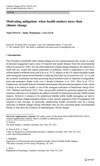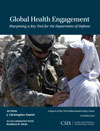-
The U.S. Military’s Role in Global Health; Motivating Behavioral Change Through Personal Health
January 19, 2015 By Linnea Bennett Climate change mitigation efforts are more broadly supported when they are framed as a public health issue, according to results recently published in Climatic Change. After polling U.S. participants with political identities ranging from very liberal to very conservative, authors Nada Petrovic, Jaime Madrigano, and Lisa Zaval found most participants, except those who identified as very conservative, believed “health” to be the most compelling reason to reduce fossil fuels. In an additional poll on whether or not air pollution is harmful to public health, both conservatives and liberals responded in the affirmative. However, if the question’s wording included fossil-fuel terminology, conservatives were less likely to agree that emissions are harmful to human health. These results suggest the idea of personal health, free of fossil fuels or other politicized rhetoric, could be a potential motivator for behavior change across a broader political spectrum.
Climate change mitigation efforts are more broadly supported when they are framed as a public health issue, according to results recently published in Climatic Change. After polling U.S. participants with political identities ranging from very liberal to very conservative, authors Nada Petrovic, Jaime Madrigano, and Lisa Zaval found most participants, except those who identified as very conservative, believed “health” to be the most compelling reason to reduce fossil fuels. In an additional poll on whether or not air pollution is harmful to public health, both conservatives and liberals responded in the affirmative. However, if the question’s wording included fossil-fuel terminology, conservatives were less likely to agree that emissions are harmful to human health. These results suggest the idea of personal health, free of fossil fuels or other politicized rhetoric, could be a potential motivator for behavior change across a broader political spectrum. An October 2014 report from the Center for Strategic and International studies calls global health engagement a “key tool” for the Department of Defense. The U.S. military’s involvement in global health activities has increased substantially over the last decade, thanks to prolonged stability operations in Iraq and Afghanistan, according to authors J. Christopher Daniel and Katherine H. Hicks. One senior official “estimated that caring for Afghani nationals amounted at times to as much as 70-90 percent of the military medical workload.” President Obama also ordered 3,000 soldiers to Liberia last fall as part of the U.S. response to Ebola. However, many of the Pentagon’s efforts have been criticized for a lack of acknowledgement of local customs and failure to coordinate with civilian institutions and NGOs. With the 2011 establishment of a “global health engagement coordinator” and correlating office, the military is continuing its mission to engage in global health and is implementing new policies to counteract some of these criticisms. Along with better accommodating local customs and building host-country and partner capacity, combatant commands are also now required to annually submit humanitarian assistance strategies and describe how proposed projects align with their respective campaign plans.
An October 2014 report from the Center for Strategic and International studies calls global health engagement a “key tool” for the Department of Defense. The U.S. military’s involvement in global health activities has increased substantially over the last decade, thanks to prolonged stability operations in Iraq and Afghanistan, according to authors J. Christopher Daniel and Katherine H. Hicks. One senior official “estimated that caring for Afghani nationals amounted at times to as much as 70-90 percent of the military medical workload.” President Obama also ordered 3,000 soldiers to Liberia last fall as part of the U.S. response to Ebola. However, many of the Pentagon’s efforts have been criticized for a lack of acknowledgement of local customs and failure to coordinate with civilian institutions and NGOs. With the 2011 establishment of a “global health engagement coordinator” and correlating office, the military is continuing its mission to engage in global health and is implementing new policies to counteract some of these criticisms. Along with better accommodating local customs and building host-country and partner capacity, combatant commands are also now required to annually submit humanitarian assistance strategies and describe how proposed projects align with their respective campaign plans.Sources: Center for Strategic and International Studies, Climatic Change.
Topics: Afghanistan, climate change, global health, Iraq, Liberia, military, mitigation, Reading Radar, security, U.S.
 A Publication of the Stimson Center.
A Publication of the Stimson Center.





